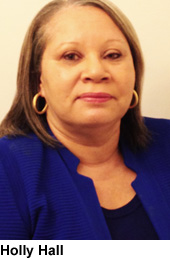They lead with moral authority and empower others.
 The author reflects on her leadership journey and identifies key attributes of servant-leaders.
The author reflects on her leadership journey and identifies key attributes of servant-leaders.
As I reflect on my 34-year nursing career and leadership journey, I conclude, based on the following definition, that I am a servant-leader. A servant-leader is “a person of character who puts other people first. He or she is a skilled communicator, a compassionate collaborator who has foresight, a systems thinker, and someone who leads with moral authority” (Sipe & Frick, 2009, p. 4). I believe I was “called” to be a nurse leader.
Nursing, in addition to its technical requirements, is about being intuitive and spiritual. Good nurses are compassionate, considerate, and empathetic. Reaching beyond self-interest, they put the well-being of those they care for before their own needs. When you properly fulfill your call to nursing, you perform at a higher level that is representative of and complementary to the vocational level—while adding a spiritual dimension.
 Competent collaborators
Competent collaborators
After obtaining my RN license, I worked on a medical unit. I loved bedside nursing. If an opportunity to help presented itself, I was often the first on my unit to volunteer, whether assisting doctors in performing procedures, volunteering for a committee to improve workflow processes, floating to another unit, staying late when the unit was short-staffed, or assisting colleagues with heavy patient loads. Seeking new opportunities to learn, promoting teamwork and camaraderie, being adaptable and flexible, providing excellent and safe patient care, and adhering to procedural guidelines were always of utmost importance to me.
I didn’t realize that my nurse leader was keenly observing my performance. She offered me the position of nurse team leader and, as a result, I was catapulted into leadership early in my career. Servant-leaders are competent collaborators.
Visionaries
To become more autonomous and independent, I transitioned from hospital nursing to home healthcare. I found it very different from hospital nursing, but the experience was just as rewarding. Home care presented a new set of challenges. I learned about Conditions of Participation (CoPs), assessment and documentation guidelines, and recommended visit frequencies for each diagnosis. Within a year, I mastered the clinical aspects of my new role.
Concurrent with learning the documentation and other legal requirements associated with home healthcare, I was constantly searching for evidence-based practices to improve procedural efficiencies. I learned about and implemented numerous innovative and highly technical infusions, including home dobutamine therapy. This intervention, publicized in Home Health Care Management & Practice in 1994, was the first of its type to be used in the Midwest region of the United States. Previously, dobutamine infusion was administered only in the telemetry unit of hospitals. Administering it at home was more cost-efficient and significantly reduced the length of hospital stays. For my work in this area, I was promoted to nursing supervisor. Servant-leaders are visionaries.
Empower others
Inspired by the excellent results we achieved with dobutamine infusion therapy, a few colleagues and I founded the Buckeye Chapter of the Intravenous Nurses Society in 1997. Soon after, we recognized the need for nurses to obtain CRNI (certified registered nurse infusion) credentialing and organized a local certification-training course. Later that year, much to our delight, 12 nurses were awarded CRNI designation.
I am passionate about empowering people to live up to their potential by using all of their abilities. I served as chapter president from 1998 to 1999. Almost 20 years later, the Buckeye Chapter continues to exist. Servant-leaders empower others.
Systems thinkers
I am also passionate about educating and empowering other leaders. As the Medicare system in the United States prepared to transition from a fee-for-service model to a prospective payment system (PPS), there was chaos, confusion—even fear-mongering—among healthcare providers. The first and only major change in Medicare since the program’s enactment in 1966, PPS was proposed in response to the expectation that, due to decreased reimbursement for services, there would be mass closings of home healthcare agencies across the United States.
In an uncertain health environment, a leader acts. In response to disinformation that was being propagated, I cofounded Unlimited Health Concepts, a 501(c)(3) organization, to educate stakeholders on current and pending healthcare legislation. We offered a seminar on PPS to local and regional executives of home healthcare, and I arranged for an official from the U.S. Department of Health and Human Services (HHS) and an internationally known attorney to speak. I frequently was asked how I managed to persuade an HHS administrator to be the keynote speaker at a local organization. My reply was, “Preparation, knowledge, and commitment to a very important purpose.” Leadership that educates, provides resources, and directs people to pursue a shared vision produces transformation. Servant-leaders are systems thinkers.
Lead with moral authority
In 2005, a chief executive officer recommended me as a home care administrator in the state of Ohio, and I was appointed to the board of directors of Ohio Council for Home Care and Hospice (OCHCH). I felt confident in my knowledge and skills as a leader. However, I was now confronted with a different type of leadership challenge—relational skills. Initially, staff members were reluctant to buy into the change in leadership. I learned that, to be successful as a leader, authenticity is very important. Leadership begins inside oneself and must remain there. To be an effective leader, a person must know his or her true self. To know how other people behave takes intelligence, but to know oneself takes wisdom. To lead others effectively, authentic leaders must understand their purpose, have solid values, and demonstrate self-discipline. Leadership is not about possessing a skill; it is about ethics and character. Servant-leaders lead with moral authority.
Skilled communicators and compassionate
I have always been committed to serving the community, both personally and professionally. Nurse leaders should be encouraged to serve on local, regional, and national boards and should encourage those they supervise to do likewise. During my career, I became known in the nursing community as an advocate for the most frail and vulnerable populations. To that end, I have testified on numerous occasions at state legislative hearings.
In addition to serving on the board of OCHCH, I served multiple terms as chair of its Political Action Committee and its Governmental Affairs Committee. Because my concerns were highly regarded by the people I employed and represented, an industry expert asked me to submit ideas to the president of the United States on how the government can address issues that impact healthcare in Ohio. Servant-leaders are skilled communicators and compassionate.
Doctoral program teaches me about myself
In 2011, I embarked upon my most challenging leadership endeavor when I was accepted into a doctoral program in organizational leadership. This rigorous and comprehensive program focused on best practices, research, and mastery of the discipline of organizational leadership. Most importantly, I learned about myself.
I developed my philosophy of leadership. I strongly believe that self-awareness is the foundation for leadership development. Self-awareness provides a base for introspection, change, and development. Leaders who know themselves, their strengths, and their effectiveness are more likely to be successful leaders. As a leader, I must assume direct responsibility for my personal development and goals and recognize that continual self-assessment and self-awareness are essential to the leadership process.
My leadership journey continues to focus on servant leadership, and I am committed to its tenets. Servant leadership is critical to achieving positive patient, staff, and organizational outcomes. RNL
Editor’s note: Holly Hall will present “Advancing Future Nursing Executive Practice: The Evidence Base for Servant Leadership in Nursing,” on Sunday, 29 October, at the 44th Biennial Convention in Indianapolis, Indiana, USA. See the Virginia Henderson Global Nursing e-Repository for additional information.
Holly H. Hall, EdD, RN, MSHA, is program manager for Premier Health Learning Institute in Dayton, Ohio, USA.
Reference:
Sipe, J. W., & Frick, D. M. (2009). Seven pillars of servant leadership: Practicing the wisdom of leading by serving. Mahwah, NJ: Paulist Press.